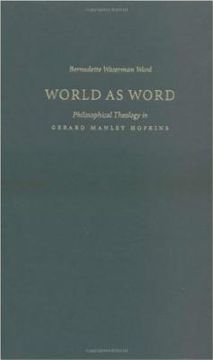Reseña del libro "world as word: philosophical theology in gerard manley hopkins (en Inglés)"
The arresting poetry of Gerard Manley Hopkins arises from philosophical engagement with the Trinity, the Incarnation, and other mysteries of Christian revelation. No previous study has explored his poetry in the light of his philosophical theology. Hopkins's thoughts on justice and language challenge today's inhuman literary theories.With explications of more than twenty-nine of Hopkins's intricate poems and difficult prose, this study traces Hopkins's engagement with his age. New, philosophically rigorous definitions of Hopkins's key poetic terms--"inscape" and "instress"--detail exactly how he discovered the possibility of multiple true concepts of things, each grounded in reality but demanding the participation of the moral will. Doubt of the possibility of historical truth drove many Victorians to scientism or vague religious sentimentalism. Hopkins asserted that humans physically can and morally must learn truth. Haunted by a sense that experience is incommunicably singular, and aware that culture and consciousness shape history, he found support in the personalist religious epistemology of John Henry Newman. On it Hopkins formed his poetics, later enriched by John Duns Scotus's communitarian theory of justice in language. Scotus deeply influenced Hopkins's idea of poetry, coloring not only his arguments and images but the metrical and verbal music of his style.Lovers of Hopkins's poetry will find a deeper understanding of his music; philosophers will find an epistemology and aesthetics worthy of respect. Students of literature will find a challenging theory of the relationship between linguistic structures and the world of experience. In today's intellectual environment, which treats the notion of truth as a cynical tool of politics, and deception as inherent in language, Hopkins's luminous vision of sacrificial love and community at the heart of poetry offers a refreshing antidote to the dry suspicions of academic literary theory.Bernadette Waterman Ward is associate professor of English at the University of Dallas. "[An] extraordinarily fine, and indeed often deeply inspiring book. . . . Ward provides dextrous and detailed readings of a number of Hopkins poems, and her discussions wonderfully integrate clarification of idea with analysis of how stylistic features (like alliteration and spring rhythm) contribute to the power of the lyrics' communications. She understands, better than many others, Hopkins' true dedication to his poetry-writing, besides recognizing his intellectual openness to such positions as 'theistic evolutionism', and his sternly chaste (but psychologically honest) dealing with admitted personal homoerotic feelings. . . . One of the most valuable Hopkins studies ever to appear."--Jeffrey B. Loomis, The Year's Work in Hopkins Studies, Victorian Poetry"Ward's excellent study, as it reveals the confluence of intellectual and spiritual aspirations, whether viewed in their poetic or their philosophical manifestation, makes for stimulating reading. In this book, philosophers learn about poetry and poets learn about philosophy. . . . This book is a useful tool for advanced undergraduates, graduate students, and specialists in literature, philosophy, or theology, as well as anyone interested in the Jesuit intellectual/spiritual tradition as it appears in the poetry of Gerard Manley Hopkins." Mary Beth Ingham, American Catholic Philosophical Quarterly"[A] valuable contribution to research on Hopkins. Her scholarship is wide and solid. Although the focuses are not new, their fresh assembly is lucid and their application to Hopkins firmly demonstrated. The exposition of Scotus's influence is especially rich and suggestive in understanding the interactive dynamic of 'selving' in Hopkins' writings." David Anthony Downes, Christianity and Literature"Of the many attempts to define t

